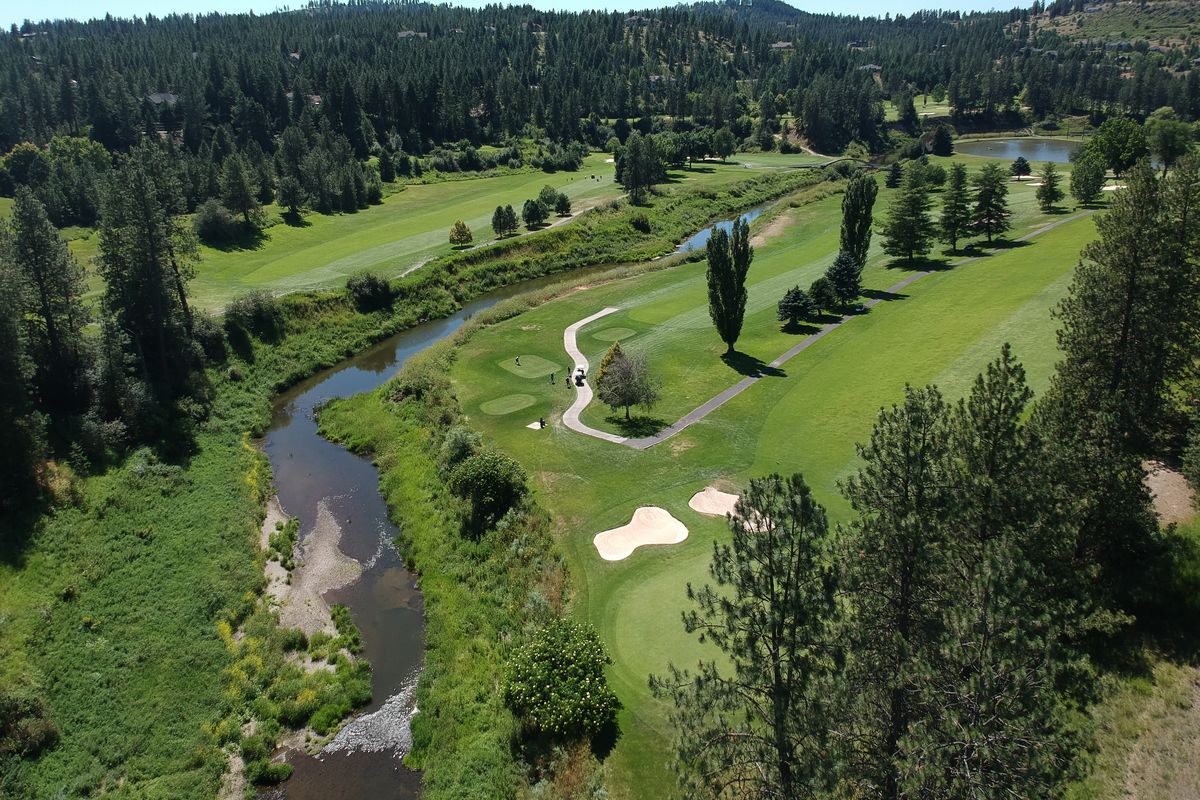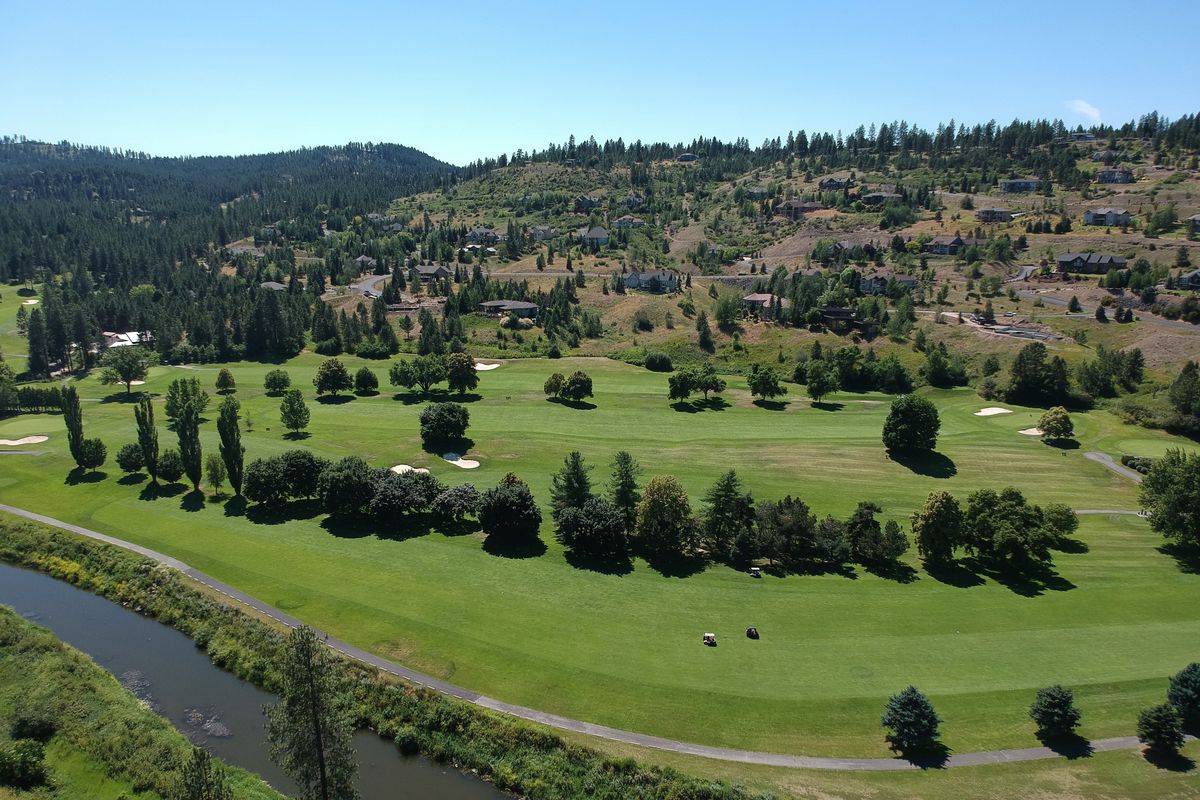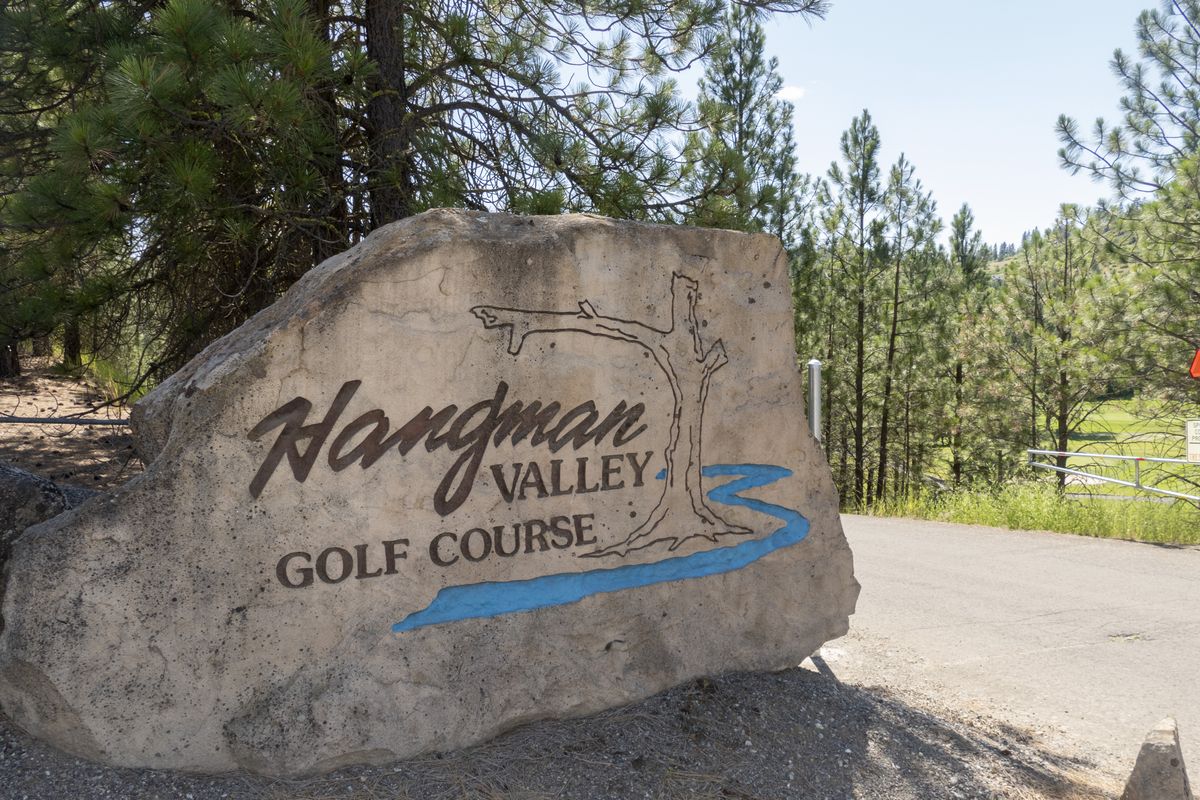Commissioners rename Hangman Valley Golf Course, but some Spokane tribal members have concerns
This is the sign at the entrance to the Hangman Valley Golf Course, owned by Spokane County, shown Monday, July 13, 2020. The name Hangman Valley, along with Hangman Creek, harkens back to when the U.S. Army executed local Indian leaders by hanging in 1858. Although most maps call the creek and valley by the name Latah, the macabre nickname has stuck. (JESSE TINSLEY)
Spokane County commissioners voted unanimously Tuesday to change Hangman Valley Golf Course’s name to Latah Creek Golf course despite concerns from some Spokane tribal members, who said they feared the name change could whitewash the region’s history.
Spokane County Commissioner Al French said he voted for the change in hopes of having a name that is respectful to Native Americans and not associated with violent acts.
“We want to clearly identify it as a destination point, but we don’t want it to be offensive,” he said.
He said the Spokane County Parks Department had attempted to get in touch with local tribes about the change, and said they could have contacted the county before the vote if they had issues.
“It’s not like it was a secret,” he said.
Chair of the Spokane Tribe Carol Evans said she would have liked an opportunity to bring the name to change to the tribe’s elders. She said she did not remember seeing an email from the county in her inbox this summer, but may have missed it.
“I’m not going to dispute their efforts,” Evans said. “If I would have known at the time, I probably would have made efforts to respond and get inputs from our elders. They’re the ones that told them in the past and were not in favor. The current elders maybe would be.”
Hangman Valley Golf Course and the Hangman Valley and the creek running through it were named for a series of executions by Col. George Wright in 1858 when the military was attempting to clear the way for white settlers. He hanged Yakama Sub-Chief Qualchan without a trial, as well as other warriors from local tribes after they came to his camp to negotiate. Wright also ordered his soldiers to burn local tribes’ food storage and slaughter hundreds of horses.
Qualchan was married to a Spokane tribe member Whist-alks, who followed him into battle and into Wright’s camp the day he was executed. She tried to free her husband and was forced to leave without him after a confrontation with soldiers. She was honored Monday, when the Spokane City Council voted to rename Fort George Wright Drive to Whistalks Way.
Warren Seyler, a Spokane Tribe member who has done tribal history demonstrations and education around the Inland Northwest, said the tribe’s historical documents indicate that as many as 27 Native Americans could have been killed by soldiers around that time.
He said many historians put the number of people hanged at around 17, but the death toll was likely much higher because at some points the military was killing any Indigenous people they found, whether they had participated in the conflict or not.
Evans said she and the tribe have been dealing with challenges lately related to the pandemic, and may have missed the emails. When informed by a reporter on Tuesday morning that the commissioners were going to vote on it later that day, she attempted to contact the county.
Evans said preserving the Hangman name has been important to many elders over the years because it starts a conversation about a story that isn’t often taught in schools, and is still important for people to learn.
“We don’t want that to be forgotten, that our ancestors were forcibly removed from our land,” Evans said. “A colonel came in to eliminate us from this earth. That was his goal, we know that. We know from the statements he made, and we don’t want that history forgotten.”
Evans said many of the elders who have spoken out against changing the name have since died, but the younger generation would likely still want to discuss it. She said many likely would have been opposed to the name Latah because it is a Nez Perce word, not Salish, the language spoken by the tribes that lived in this area during that time. The word was used by white settlers and soldiers at the time because Nez Perce scouts worked with the army during that time.
Commissioners authorized Spokane County Parks staff and the county’s golf advisory committee, a group of community members that makes recommendations on the management of the golf course, to look into changing the name after a constituent with concern about Fort George Wright Drive and the golf course contacted the city in June. The concern was forwarded to the county and the parks department, and members of the county’s golf committee emailed leaders of the Coeur d’Alene, Kalispel and Spokane tribes in June and July to request input about a new name.
Spokane County Parks Director Doug Chase said he and the county’s golf committee thought the lack of response might have meant there was not objection or interest in a new name.
“We felt that perhaps that was the message we were to work with, so leaned heavily on the history and information that was available to us,” Chase said. “There was a lot of positive discussions related to Latah Creek as a name that would recognize the native heritage of the area geographically in a positive light, and not be confused in any way with the atrocities that took place out there.”
On Tuesday afternoon, commissioners unanimously voted to change the name of the golf course.
Spokane County Commissioner Mary Kuney said she did reach out to Evans before the vote to apologize and explain the county had attempted to contact the tribe, but said she voted for the name change because it is what the committee recommended and they had followed policy.
“It was on the published agenda for today and we followed the procedures we normally do,” she said.
Spokane County Commissioner Josh Kerns said the public and the tribes could have found out the change through the story that ran in The Spokesman-Review in July, and had a chance to respond.
“There was multiple times for them to weigh in,” Kerns said. “In the end, we tasked this to our golf advisory committee. They could have come back and said they don’t recommend a change. They felt it was an appropriate name. I’m going to respect the work and the process.”
EWU history professor Larry Cebula said the Hangman name has been debated in the newspaper and by public officials for over a century, with clippings from the late 1800s showing some community members and even a state senator arguing for a change. Past suggested names include Latah, Santooln and Plummer.
“This is an old controversy that seems to come up with every generation,” he said.
In 1997, Spokane County Commissioners voted to change references of Hangman Creek to Latah Creek in all county documents, but efforts to have that change recognized elsewhere failed.
The U.S. Board on Geographic Names rejected the change in 1999, according to Spokesman-Review archives, with some board members arguing it was an attempt to erase a dark period in the region’s past. The creek’s name is still listed as Hangman in the agency’s domestic name database.
“What we’re doing is an attempt to change history,” said Bernard “Chick’’ Fagon, a member of the board and a National Park Service employee at the time. “I think we should do that as a last resort. Sometimes there are warts on the face. We need to recognize it.”
Margo Hill, an EWU urban planning professor, member of the Spokane Tribe and one of the supporters of the city’s renaming of Fort George Wright Drive, said leaders should look at name changes on a case-by-case basis and consult with tribes every time.
She said she and many other Native people living in the Spokane area were against any street or landmark honoring Wright because he was behind an effort to violently remove Indigenous people from their land. She said other names used in locations around the country, like squaw, are also offensive and likely need to be changed. She said she believes anything bearing the name Hangman should remain because changing it is whitewashing the land’s history.
“I know it’s not pleasant to say, ‘Oh, I’m going to make my golfing reservations at the Hangman.’ Yeah, that’s a brutal name, because brutal things happened there,” she said.
Raymond Reyes, Gonzaga University Associate Provost and Chief Diversity Officer, said if the county’s goal was to be inclusive and respectful, it should have waited for the tribe, even if it extended the timeline.
“My recommendation is to hit the pause button, don’t vote on it until you do your homework,” he said.
“Do a thorough consultation with the Spokane Tribe and find out what they want.”
Reyes said name changes are important and before they happen, people need to look into their own motives – whether they are trying to honor a group, or cover something up and make themselves more comfortable.
“Haste (makes for) flawed thinking,” he said, “Cultural integrity is asking the right person the right question.”
According to county documents, the name change is estimated to cost between $10,000 and $30,000 to update signage, letterhead and scorecards, and facility fees will be used to cover the costs.


